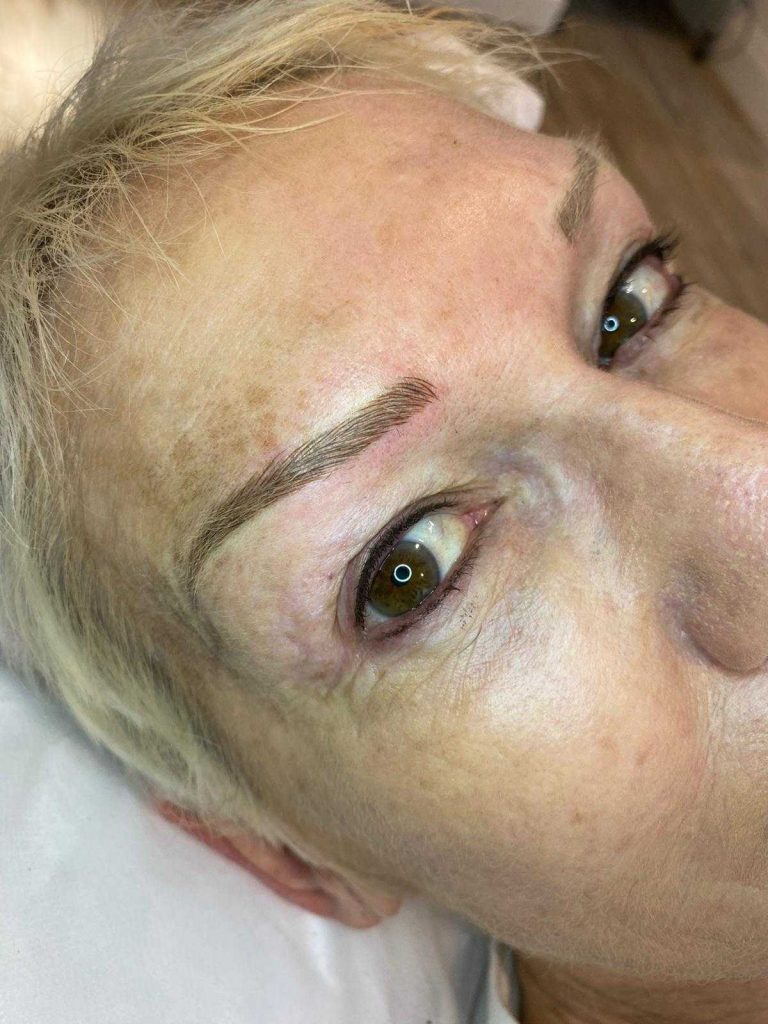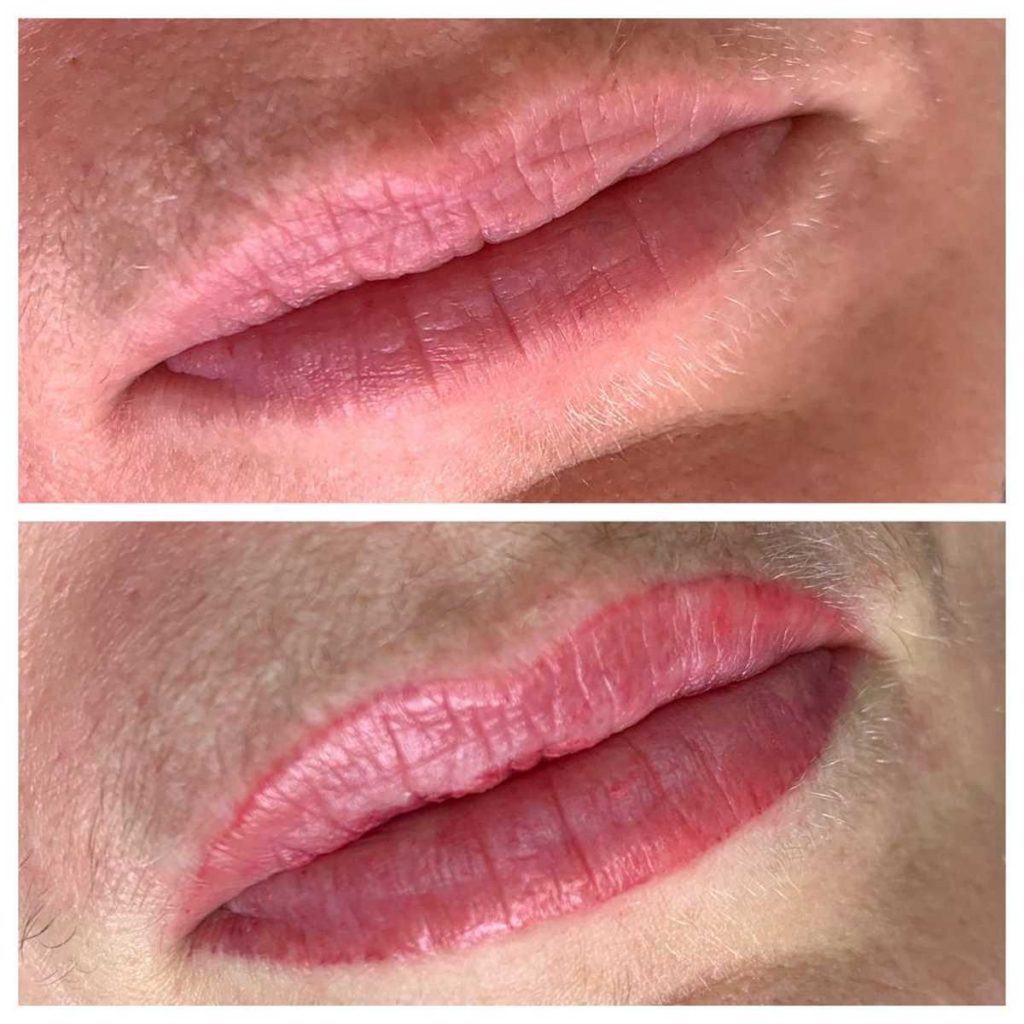Cosmetic tattooing has revolutionised the beauty world, offering a semi-permanent solution to enhance your features without the daily hassle of makeup. From perfectly shaped eyebrows to defined lips and eyeliner, this practice has gained immense popularity in recent years.
However, one question always comes up: how long do these tattoos actually last? In this blog, we’ll take a closer look at the lifespan of various cosmetic tattoos, factors that affect their longevity, and tips on how to extend their beauty.
Whether you’re considering microblading or lip blushing, understanding what to expect in terms of maintenance and fading is key to making the most of your beauty investment.
Let’s get straight to the point
Cosmetic tattoos, such as microblading, lip blushing, and eyeliner tattoos, typically last 1-5 years, depending on the technique, skin type, and lifestyle factors. Key factors like sun exposure, skincare routines, and proper aftercare influence their longevity.
Regular touch-ups every 12-18 months help maintain vibrancy. To extend the life of your cosmetic tattoos, protect them from UV rays, avoid harsh exfoliants, and follow your tattoo artist’s aftercare instructions. With the right care, cosmetic tattoos provide a semi-permanent beauty solution with long-lasting results.
The Average Lifespan Of Cosmetic Tattoos
1. Eyebrow Tattoos
Eyebrow tattoos, especially techniques like microblading, ombre brows, and feather brows, are among the most popular forms of cosmetic tattooing. The average lifespan of eyebrow tattoos can vary:
- Microblading: 2-3 years
- Ombre Powder Brows: 1-3 years
- Feather Brows: 8-12 months
- Henna Brows: 2-4 weeks
- Nano Brows: 1-3 years
Microblading involves using fine blades to create hair-like strokes, giving a natural appearance. Although it’s classified as semi-permanent, the tattoo typically lasts up to three years, with regular touch-ups required to maintain the look. Feather brows, a similar but less durable technique, only last 8-12 months due to the more superficial application of the pigment.
2. Lip Tattoos
Lip tattoos or lip blushing add a tint to the lips, giving them a fuller and more defined appearance. The typical lifespan of lip tattoos is between 3-5 years, depending on factors like sun exposure and skin type. The fading process happens gradually, but most people opt for a touch-up within the first 2-3 years.
3. Eyeliner Tattoos
Permanent eyeliner provides a long-lasting solution for defining the eyes. Though called “permanent,” this form of tattooing generally lasts between 1-3 years, depending on skin type, lifestyle, and how deep the ink was applied. For some individuals, the tattoo can last as long as five years with proper care and occasional touch-ups.
4. Freckle Tattoos
Freckle tattoos have grown in popularity as a cosmetic choice for adding natural-looking freckles to the face. The average lifespan of freckle tattoos ranges from 2-3 years, after which they gradually fade as the skin naturally exfoliates.
5. Scalp Micropigmentation
Scalp micropigmentation is a technique used to mimic the appearance of hair follicles on the scalp, often for those experiencing thinning hair or baldness. This procedure typically lasts between 4-6 years, but touch-ups may be required to maintain the effect.
6. Lash Lift And Extensions
Though not strictly tattoos, lash lifts and lash extensions are commonly grouped under cosmetic enhancements. Lash lifts last 6-8 weeks, while lash extensions have a shorter lifespan, also between 6-8 weeks, requiring regular maintenance for best results.
Factors Affecting The Longevity Of Cosmetic Tattoos
1. Skin Type
Your skin type plays a major role in how long a cosmetic tattoo lasts. Oily skin tends to shed pigment faster than dry skin, causing tattoos to fade more quickly.
On the other hand, people with dry skin may find their tattoos hold pigment better, resulting in longer-lasting results.
2. Sun Exposure
Prolonged sun exposure can significantly reduce the lifespan of cosmetic tattoos. UV rays break down the pigment, causing it to fade faster.
People who spend a lot of time outdoors or under direct sunlight without protection may notice that their cosmetic tattoos fade quicker than those who limit their exposure to the sun.
Solution: To extend the life of your tattoo, it’s recommended to use sunscreen on the treated areas and limit time in direct sunlight whenever possible.
3. Skincare Routine
The products you use on your skin can have a direct impact on the longevity of your tattoo. Exfoliants, such as glycolic acid, retinoids, and chemical peels, accelerate the fading process by removing the outer layer of skin where the pigment is stored.
Similarly, microdermabrasion and other treatments designed to exfoliate or renew the skin can also cause cosmetic tattoos to fade prematurely.
Solution: If you’ve had cosmetic tattoos done, avoid using harsh exfoliating products or treatments on the tattooed area unless directed by your cosmetic tattoo artist.
4. Quality Of Pigment
The quality of the pigment used in the tattooing process greatly affects how long it will last. High-quality pigments tend to be more stable and fade more evenly, ensuring a natural look as the tattoo ages.
In contrast, lower-quality pigments may change colour as they fade, resulting in an undesirable appearance, such as eyebrow tattoos turning blue or green over time.
Solution: Always ensure that your tattoo artist uses high-quality, FDA-approved pigments to avoid uneven fading or colour changes.
5. Touch-Up Frequency
Regular touch-ups help maintain the colour and shape of the tattoo. While some people may prefer to allow the tattoo to fade before redoing it entirely, others opt for more frequent touch-ups to keep their cosmetic tattoos looking fresh.
Typically, touch-ups are needed every 12-18 months for most cosmetic tattoos.
6. Technique Used
The technique used during the procedure can influence the longevity of the tattoo. For example, microblading involves more superficial pigment application, which naturally fades faster compared to deeper pigment placement in ombre brows or nano brows.
Solution: Discuss with your tattoo artist which technique is best suited for your desired results and how long you want the tattoo to last.
7. Lifestyle Factors
Lifestyle choices, such as frequent sweating, regular exposure to chlorinated water, or smoking, can also contribute to faster fading. Excessive sweating, particularly from activities like exercise, can speed up the body’s natural process of shedding skin cells, causing the pigment to break down sooner.
Solution: If you lead an active lifestyle, be prepared for more frequent touch-ups to maintain your cosmetic tattoo.
8. Use Of Medications
Certain medications can affect how well the skin retains pigment. For example, blood thinners may cause more bleeding during the tattooing process, which can dilute the pigment and lead to quicker fading.
Medications that increase skin cell turnover can also reduce the lifespan of the tattoo.
Solution: Inform your tattoo artist about any medications you are taking to ensure that the proper precautions are taken during the procedure.
9. Aftercare
Aftercare is one of the most important factors in ensuring the longevity of your cosmetic tattoo. Proper care immediately after the procedure can help the pigment settle into the skin and avoid complications such as scabbing or pigment loss.
It’s essential to follow your tattoo artist’s instructions for post-treatment care, including avoiding water exposure, not picking at scabs, and using any recommended healing ointments.
Solution: Adhering strictly to the aftercare regimen will help ensure that your tattoo heals correctly and lasts as long as possible.
10. Natural Body Functions
Your body’s natural metabolism and healing rate also influence how long a cosmetic tattoo lasts. Some individuals naturally shed skin cells more quickly, which can lead to faster fading. Others may find that their skin retains the pigment for longer periods.
Solution: While this factor is largely beyond your control, keeping up with touch-ups can ensure that your tattoo remains vibrant for as long as possible.
FAQs About Cosmetic Tattoo
How Long Does Cosmetic Tattooing Typically Last?
Cosmetic tattoos generally last between 1 to 3 years, depending on skin type, lifestyle, and aftercare.
What Factors Affect The Longevity Of Cosmetic Tattoos?
Sun exposure, skin type (oily skin may fade faster), and the quality of ink and technique used can impact how long the tattoo lasts.
Can I Extend The Lifespan Of My Cosmetic Tattoo?
Yes, by following proper aftercare, avoiding excessive sun exposure, and scheduling touch-ups, you can prolong the results of your tattoo.
Do Cosmetic Tattoos Fade Completely Over Time?
Yes, cosmetic tattoos are semi-permanent and will fade gradually, requiring touch-ups to maintain their appearance.
How Often Should I Schedule Touch-Ups For Cosmetic Tattoos?
Touch-ups are usually recommended every 12 to 18 months to keep the tattoo looking fresh and well-defined.



